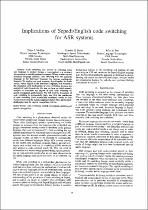JavaScript is disabled for your browser. Some features of this site may not work without it.
- ResearchSpace
- →
- Research Publications/Outputs
- →
- Conference Publications
- →
- View Item
| dc.contributor.author |
Modipa, TI

|
|
| dc.contributor.author |
Davel, MH

|
|
| dc.contributor.author |
De Wet, Febe

|
|
| dc.date.accessioned | 2014-03-25T06:20:35Z | |
| dc.date.available | 2014-03-25T06:20:35Z | |
| dc.date.issued | 2013-12 | |
| dc.identifier.citation | Modipa, T.I, Davel, M.H and De Wet, F. 2013. Implications of Sepedi/English code switching for ASR systems. In: Conference Proceedings of the 24th Annual Symposium of the Pattern Recognition Association of South Africa, Johannesburg, South Africa, 3 December 2013 | en_US |
| dc.identifier.uri | http://www.prasa.org/proceedings/2013/prasa2013-10.pdf | |
| dc.identifier.uri | http://hdl.handle.net/10204/7287 | |
| dc.description | Conference Proceedings of the 24th Annual Symposium of the Pattern Recognition Association of South Africa, Johannesburg, South Africa, 3 December 2013 | en_US |
| dc.description.abstract | Code switching (the process of switching from one language to another during a conversation) is a common phenomenon in multilingual environments. Where a minority and dominant language coincide, code switching from the minority language to the dominant language can become particularly frequent. We analyse one such scenario: Sepedi spoken in South Africa, where English is the dominant language; and determine the frequency and mechanisms of code switching through the analysis of radio broadcasts. We also perform an initial acoustic analysis to determine the impact of such code switching on speech recognition performance. We nd that the frequency of code switching is unexpectedly high, and that the continuum of code switching (from unmodi ed embedded words to loan words absorbed in the matrix language) makes this a particularly challenging task for speech recognition systems. | en_US |
| dc.language.iso | en | en_US |
| dc.publisher | PRASA 2013 Proceedings | en_US |
| dc.relation.ispartofseries | Workflow;12235 | |
| dc.subject | Code switching | en_US |
| dc.subject | Speech recognition | en_US |
| dc.subject | Multilingual speech recognition | en_US |
| dc.title | Implications of Sepedi/English code switching for ASR systems | en_US |
| dc.type | Conference Presentation | en_US |
| dc.identifier.apacitation | Modipa, T., Davel, M., & De Wet, F. (2013). Implications of Sepedi/English code switching for ASR systems. PRASA 2013 Proceedings. http://hdl.handle.net/10204/7287 | en_ZA |
| dc.identifier.chicagocitation | Modipa, TI, MH Davel, and Febe De Wet. "Implications of Sepedi/English code switching for ASR systems." (2013): http://hdl.handle.net/10204/7287 | en_ZA |
| dc.identifier.vancouvercitation | Modipa T, Davel M, De Wet F, Implications of Sepedi/English code switching for ASR systems; PRASA 2013 Proceedings; 2013. http://hdl.handle.net/10204/7287 . | en_ZA |
| dc.identifier.ris | TY - Conference Presentation AU - Modipa, TI AU - Davel, MH AU - De Wet, Febe AB - Code switching (the process of switching from one language to another during a conversation) is a common phenomenon in multilingual environments. Where a minority and dominant language coincide, code switching from the minority language to the dominant language can become particularly frequent. We analyse one such scenario: Sepedi spoken in South Africa, where English is the dominant language; and determine the frequency and mechanisms of code switching through the analysis of radio broadcasts. We also perform an initial acoustic analysis to determine the impact of such code switching on speech recognition performance. We nd that the frequency of code switching is unexpectedly high, and that the continuum of code switching (from unmodi ed embedded words to loan words absorbed in the matrix language) makes this a particularly challenging task for speech recognition systems. DA - 2013-12 DB - ResearchSpace DP - CSIR KW - Code switching KW - Speech recognition KW - Multilingual speech recognition LK - https://researchspace.csir.co.za PY - 2013 T1 - Implications of Sepedi/English code switching for ASR systems TI - Implications of Sepedi/English code switching for ASR systems UR - http://hdl.handle.net/10204/7287 ER - | en_ZA |






